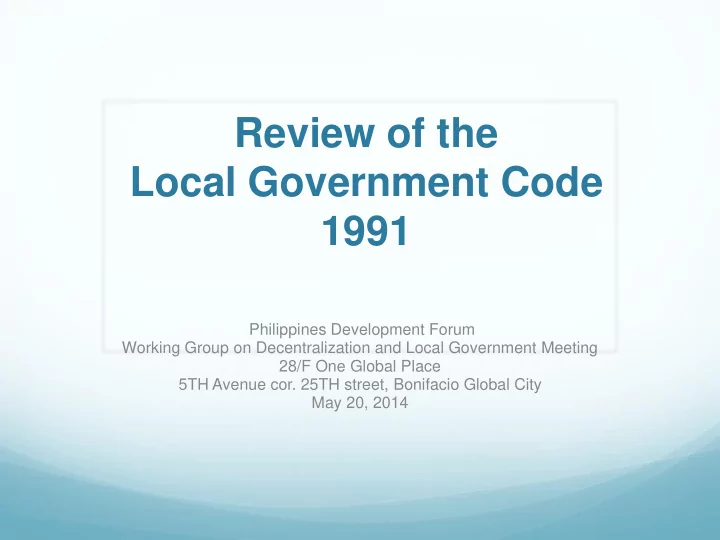

Review of the Local Government Code 1991 Philippines Development Forum Working Group on Decentralization and Local Government Meeting 28/F One Global Place 5TH Avenue cor. 25TH street, Bonifacio Global City May 20, 2014
LGC 1991 Review 1. Background 2. Guiding Principles 3. Current Issues 4. Proposed Scope 5. Methodology and Workplan 6. Institutional Approach 7. The leading role of the CCD
Background Widespread agreement among stakeholders that the LGC has structural deficiencies that need to be addressed through a government-led review. Essential to realize the objectives set on the PDP 2011- 2016: inclusive growth, macroeconomic stability and curbing corruption. Review is incorporated in the work plan of the Good Governance and Anti-corruption Cabinet Cluster CCD is entrusted with conducting the review, under the chairmanship of the DILG.
Current Issues 1. Unequal and biased sharing of wealth 60-40 sharing in favor of the central government IRA distribution favors cities when in fact, cities are less dependent on IRA IRA dependency of cities = 39% to 49% IRA dependency of provinces and municipalities = 74% to 85%
Current Issues
Current Issues Tax assignment favors cities Municipalitie Tax Base Cities Provinces Barangays s Real Property Transfers X X Business of Printing and Publication X X Franchises X X Sand, Gravel, and other Quarry Resources X X * * Amusement Places X X * Professionals X X Delivery Vans and Trucks X X Real Property X X * * Idle Lands X X Businesses X X X Community Tax X X * * Shares in the proceeds of levy that collects the tax
Current Issues 2. Level and architecture of devolution Form do not follow function Basic and frontline social services are with the LGUs but resources including technical expertise remained at the central/regional level Recent developments inter-governmental transfers Central government programs effecting transfers to LGUs (i.e., Grassroots Planning and Budgeting/Bottom-up Budgeting, Performance Challenge Fund, etc.)
Current Issues 3. Term limits and numerous elections 3 years is too short for good leaders, and 3 terms is too long for bad ones 3-year term also results to non-continuity of good projects especially if the implementing mayor is not re-elected 4. Weak demand side A significant number of LGUs lacks genuine partners from the CSOs and NGOs Napoles Scandal affected the credibility of NGOs as a whole
Current Issues 5. Barangay Governance Barangays were left at the sidelines as focus centered on city and municipal governments Weak capacity of barangay LGUs which makes them more prone to political excesses Inutile Sangguniang Kabataan leading to wastage of resources
Guiding Principles Inclusive collect the views of all stakeholders Government-led recommendations from the review will be submitted to the Oversight Committee for Devolution and LEDAC. Transparent supported by a consultations and communications strategy to ensure it does not remain a merely academic and bureaucratic exercise. Evidence-based supported by a number of existing studies and research by national and international experts. Additional technical and advisory support will be contributed, on – demand, by the Technical Team constituted to support these efforts. Time-bound The review and its recommendations will be completed before end of 2014.
Proposed Scope: Fiscal Policy 1) The detailed scope of the review will be defined by the Coordinating Committee on Decentralization. 2) Focus the review is on aspects relative to intergovernmental fiscal relations, as mandated by the work plan of the Good Governance and Anti-corruption Cabinet Cluster. 3) A tentative list of the relevant topics, may include: i. Clarifying service delivery responsibilities by LGUs. ii. Expanding and increasing the potential of LGUs’ own revenue sources. iii. Improving the efficiency and adequacy of the fiscal transfer system. iv. Addressing jurisdictional formation policies and the framework for LGU alliances.
General Steps Stakeholder Getting the and political support of economy Congress mapping Drafting a bill and the acceptable to all President stakeholders Inventory, consolidation, and solicitation of proposals
Methodology and Work Plan A technical team will be established consisting of a Lead Advisor, a Senior Fiscal Decentralization Expert, a Fiscal Decentralization Expert, a Communications Specialist. A number of National and International Advisers, recruited on demand, which will fill very specific research or advisory gaps in the analysis, on demand – “ Eminent Persons Panel ” Preparatory Work (Now) 1. A meeting of the CCD (March) will discuss the proposed scope and timing of the review, its institutional structure, and the proposed workplan. 2. The CCD will inform all relevant stakeholders on the initiation of the review and the upcoming consultation process. 3. Recruitment of all national experts to be completed as early as possible.
Methodology and Work Plan Initial Consultation process 1. Preparation of a consultation and communications strategy in order to gather the views of all relevant stakeholders. 2. The technical team will sustain initial consultations with the representatives of stakeholder groups in order to inform the objectives and scope of the review and identify technical gaps that need to be filled with external advisory assistance. 3. On the basis of the initial consultations with stakeholders, finalization of the work plan of the technical team, for its endorsement by the CCD.
Methodology and Work Plan Implementation of the review, including: 1. Coordination of all research and technical input from national and international experts. 2. Preparation of position papers per topic, as identified in the scope of the review. 3. Presentation of the position papers to CCD, including, as required external representatives from private sector, civil society, legislature, development partners, etc. 4. Formulation of amendments to the code prior to their submission to OCD.
Institutional Approach
Recommend
More recommend